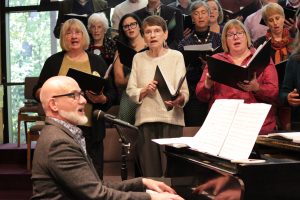
Some technological advances have brought up questions of economy if not ethics. For instance: electronic keyboards can now quite effectively reproduce the sound of orchestral percussion, strings and most woodwinds. This advance has put a lot of working musicians out of a job as theaters have opted for the more economical option of reducing a show orchestra (or ‘pit band’ as they are often called in the biz) to two keyboards and a drummer. This, in turn, brings up the larger question of: how far down the automation line do we want music to go?
I remember years ago in Chicago I was doing a performance with some of the opera singers from the Fairmont Hotel. We had been hired by a local businessman to sing some arias and our famed Birthday Song for a private party. When we walked in we saw, for the first time, a grand piano playing itself. This was not a rinky-dink saloon-style player piano. This was a digital box attached to an actual grand piano that manipulated the keys in a way that made it sound almost as if a human were playing.
But the key word here is ‘almost.’ Even though the input for this digital device had been created by an actual pianist, the ‘performance’ itself was mechanical and dry. While the novelty of watching a piano play itself was interesting, none of us felt that what we were hearing was actual music. I have heard numerous pieces that were composed through an algorithm, mimicking how some of the most famous and beloved songs in our collective cultures are shaped. And even though the formulae may have been spot-on, the result of the sounds created have left me cold. It was interesting, to be sure. But it was not music.
And here is where I think the road to technological advances will always (thankfully) stop. A computer-run device can do many things, but it can not express emotions. It can be programmed to try to replicate what expressing emotions sounds like, but it will always fall short of that goal. To be human is to be a laughing, weeping, singing, burping fusion of organic, unpredictable and wholly wonderful elements. We feel. We hope. We grieve. We dance. We fear. We sing. And we have goosebumps. No computer simulation can reproduce that.
One of the things I have marveled at in conducting various choirs and ensembles over the years is how each choir truly is greater than the sum of its parts. Something ineffable happens when two voices join together. Add a third, a fifth, a hundred more, and suddenly you are part of what can only be described as a spiritual event. We all breathe together. We all sing together. We send this collected sound out into the universe, and those within hearing range are lifted. It’s like each member of the choir, and then the choir as a whole is creating a beautiful, warm, multicolored life form and sending it flying through the air. If all goes well, this life form continues to grow in the ears, minds and hearts of those who hear it. And these people continue to give it further life as they leave the performance/worship space with smiles on their faces and more light in their hearts. I can not imagine any system of electronically reproduced sounds having that same effect.
I am grateful to be able to be part of this process of continually discovering and sharing new life in the form of music. I am grateful for the many opportunities we all have to participate in this life-affirming and often life-saving event. May we all tune our hearts to always find these places where life is created and shared before our very eyes. And ears.
And, if you feel so inclined, you may be part of this creative expression every Thursday night with the East Shore Unitarian Church Choir. We love, we laugh, we sing, we leave each Thursday brighter and lighter than when we came. It is a grace to be able to so constantly join the utterly human with the absolutely divine.
Eric Lane Barnes
Interim Director of Music
